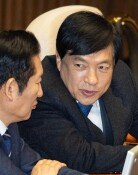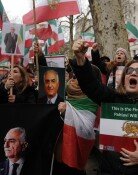No Expansion Competition for Shinhan
No Expansion Competition for Shinhan
Posted August. 23, 2006 03:23,
Na Eung-chan , the chairman of Shinhan Financial Group, declared on August 22, We will not compete with other banks in size any longer.
The domestic capital argument that is concerned about the nationality of the shareholders of a financial firm can weaken the competitiveness of Korean finance, he added. Chairman Na made such comments at an exclusive interview with Dong-A Ilbo which was held at the conference room of Shinhan Financial Group on the 16th floor of the head office building in Taepyeongno, Jung-gu, Seoul.
Led by Na, Shinhan Financial Group emerged into a newsmaker once again when it was recently selected as the preferential negotiating partner of LG Card. More than anything else, the financial business sector paid attention to the fact that Shinhan became that big to check Kookmin Bank (with assets of 286 trillion won) with its 219 trillion won in assets after underwriting LG Card.
But Na made a rather contradictory comment saying, Why does it matter? Shinhan will back out of the structure in which the banks compete with each other by expanding their size.
The directors who were present at the interview gave confused looks, too.
Diversifying the business models is more important than expanding the size, Na said. Underwriting LG Card was more aimed at developing financial items based on the data on customers and cross-selling them rather than augmenting the assets.
Rumors are rumors. Some people said that I raised the acquisition price by 1,000 won per stock prior to the end of the bidding. But that doesnt make sense.
Na explained that a report by a member of the press, who wrote that Na ordered 1,000 won per stock be added to the price that the practical managers suggested right before handing in the bill bidding for LG Card and led Shinhan Financial Group to be selected as the preferential negotiation partner by a whisker, was fictional and not based on fact finding.
How could I take such rash actions with all those foreign acquisition consulting firms and practical managerial teams? I just made minor adjustments at the last stage with the president of the Shinhan Financial Group Lee In-ho, he confessed.
This explained that even though the prevalent 1,000 won betting rumor added persuasion to itself backed by the fact that the extreme development of Shinhan Financial Group would not have been possible without the unique charisma and leadership of Chairman Na, in fact it was not true.
Im not an expert in finance. Im far from being charismatic. The presidents of the affiliate firms all do the job. I just keep an eye on what they do.
Na has grown up in the bank over 48 years. And he says hes not good at finance. It seemed that he was lowering himself intentionally to avoid the pressure from his nickname, Charisma Management.
On the same day he expressed his disapproval against the culture that cares about the nationality of financial capital. The largest portion of Shinhan Financial Group is held by Korean Japanese who own 17 percent. Some of them have Japanese nationality. In addition, the total shares held by foreigners comprise 61.04 percent. I dont easily understand why people stick to the domestic capital argument even when the foreign capitals create jobs here without threatening managerial sovereignty. Such nationalism can hinder the development of the Korean finance business, he asserted.
He said that he cannot agree to the argument that the banks into which the public funds were injected should be acquired by domestic firms. His opinion is that with no domestic firm or fund capable of acquiring Woori Bank, regulating the qualification for acquisition can only give the impression that we are exclusionists.
The Financial Supervisory Service (FSS) carried out window guidance itself in June this year in order to put a ceiling on the amount of real-estate mortgaged loans by banks. Na commented that the window guidance by FSS was an appropriate measure. He spoke in favor of the policy, saying that it was a preemptive response aimed at preventing the amount of loan from growing big enough to pressure the bank management.
While some criticized the policy as government controls on finance, Na himself stated that theres no longer any government control on finance in Korea.
We asked him whether the financiers and the firms included in the so-called Lee Heon-jae associates thrived in the past. And we added the question whether the relationship with the government does not still have a considerable degree of influence on management.
To this he laughed, saying, Does that make me a Lee Heon-jae associate now? as if to ask whether Shinhan thrived without the help of the government and is still succeeding.
legman@donga.com



![“잠만 자면 입이 바싹바싹”…잠들기 전에 이것 체크해야 [알쓸톡]](https://dimg.donga.com/c/138/175/90/1/wps/NEWS/IMAGE/2026/02/23/133404749.3.jpg)



